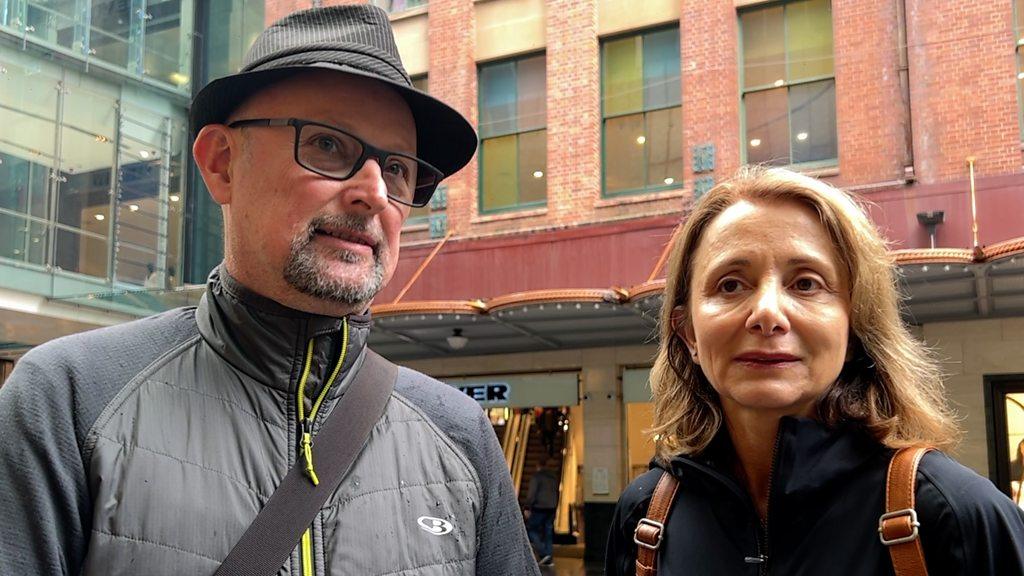Queen Elizabeth II death: What comes next for Australia?
- Published
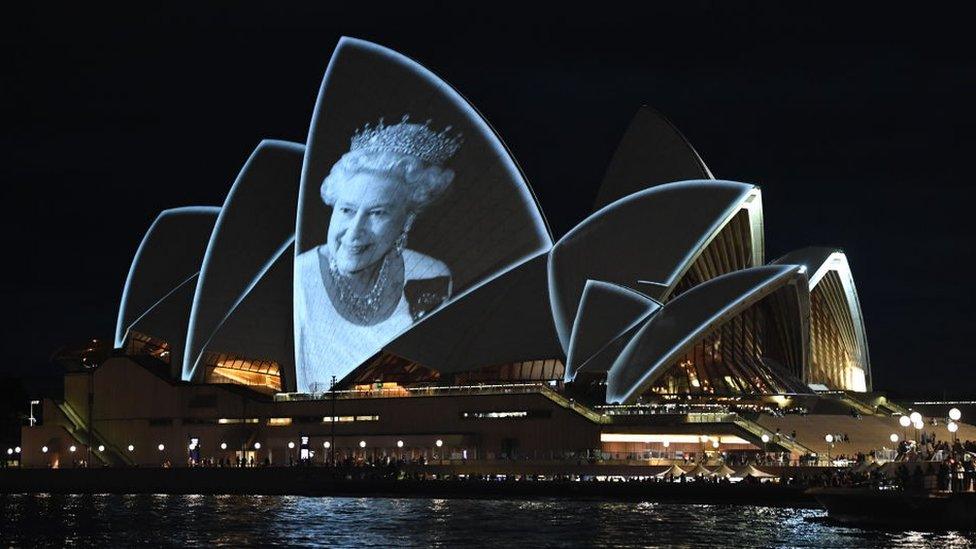
The Sydney Opera House has displayed a tribute to Queen Elizabeth II
"I grew up singing God Save the Queen and today was the first time singing God Save The King. I'm so proud of Charles but my heart breaks for the Queen," said Litiana Rakarakatia Turner, on the verge of tears.
She joined large crowds of Australians in Sydney for the local proclamation of King Charles III, which followed a national ceremony in Canberra.
There, they cheered "God save the King", marking the beginning of a new chapter for Australia and its relationship with the monarchy.
The King is now Australia's ruling monarch and head of state. But his mother's absence is still deeply felt here.
"[I am] happy and sad," another woman, Frances Kinraid, told the BBC. "The Queen's gone but we have a new King. I just hope it goes well for Charlie... King Charles!" she corrected herself, smiling.
The passing of Queen Elizabeth II set in motion a series of official events in Australia.
There was a wreath-laying ceremony at the Queen's terrace in Parliament House on Saturday. Parliament itself has been suspended for a fortnight. A national day of mourning - a one-off public holiday - will be held on 22 September. Flags will remain at half-mast until after the Queen's funeral. Banknotes and coins will eventually feature the King.
And the Queen's death has also pushed the republican debate back to the fore here.
"I said the next time we vote on this will not be before the end of the Queen's reign. Well, the Queen's reign has ended," former prime minister Malcolm Turnbull told the BBC.
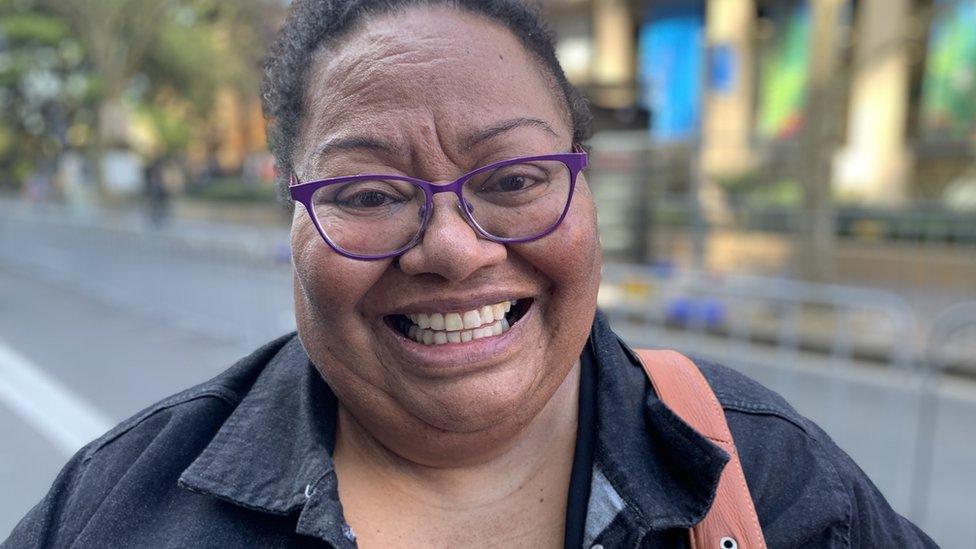
Litiana Rakarakatia Turner attended a proclamation ceremony in Sydney
He added that while a referendum won't happen immediately, it was inevitable.
Mr Turnbull is a staunch republican - but on Friday, he teared up on national broadcaster ABC while speaking about his memories of the Queen.
It was a poignant demonstration of the complicated relationship Australia has with the monarchy.
After the proclamation on Sunday, Prime Minister Anthony Albanese said this was a time to pay respect and tributes to the life of the Queen. The bigger constitutional questions are to be tackled later.
His government, however, has previously made it clear that a referendum will be on the cards at some stage.
A week before the Queen's Platinum Jubilee earlier this year, Matt Thistlethwaite was appointed assistant minister for the republic. For the first time, a government MP had been given the official task of making the case for Australia to become a republic with an Australian head of state.
Though much remains unclear, a referendum appears likely to happen if the Albanese government wins a second term in 2024 or 2025.
When the question was put to the people in a 1999 referendum, the "No" vote won as most Australians chose to stick with the Queen. At the time, support for the republic fractured over which model to adopt.
The one huge difference now, of course, is the death of the Queen. She was the strongest bond between Australia and the monarchy. Many have said it feels "like losing a member of your family".
And while you hear a lot of goodwill for King Charles III, the sentiment is just not the same.
Local woman Else Fox attended the proclamation in Sydney because "it's an important occasion - it's part of history".
"Where we're going with our democracy, it's going to be interesting to see. But we've got to honour what the Queen did," she said.
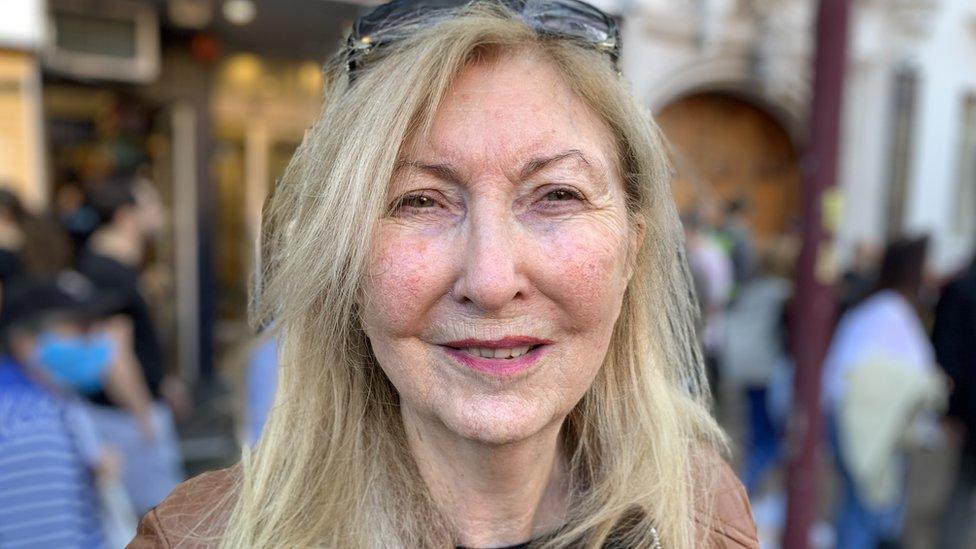
Elsa Fox says it will be "interesting" to see how debates play out
It's a complex issue to untangle for many Australians: this independent national spirit and an enduring love for the Queen.
Australian Republic Movement chairperson Peter Fitzsimons said: "With the greatest respect to Charles III - and I mean that; I have nothing against him personally - he does not enjoy the same deep wellspring of affection and loyalty that Her Majesty did."
There's also a generational question. While the Queen remained a constant presence, Australia has changed significantly.
"The young people relate more to the younger royals than the generation of [King] Charles," said Emma Stanton, an accountant and finance manager.
Ms Stanton said Australians should give the King a chance but to her and others he feels more like an "in between" monarch. She added that young Australians "are ready for the new generation - for William - to take the throne".
"I'm the same age as Prince Harry, so I've grown up with this generation of royals," she said.
The death of the Queen has also brought on many difficult emotions for Australia's First Nations people. While many are mourning her, others have spoken of a renewed sense of trauma from the painful legacy of colonisation and the role of the Crown in the displacement and violence enacted on Indigenous Australians.
When the Queen's reign began, Aboriginal Australians were not even counted as part of the population. Fast forward 70 years and the King's proclamation ceremony in Canberra started with an Indigenous Welcome to Country ceremony, as is commonplace for events now.
"When she came here in 1954, she was a British Queen visiting a nation that saw itself as British," Malcolm Turnbull said of the Queen's historic first royal tour.
"It was a very different Australia."
Queen Elizabeth II: Australians pay tribute to 'a great monarch'
Some still see the monarchy as an important symbol of stability. Josh Robb, who describes himself as a monarchist, said Australia would still give its new monarch a chance.
"We need that continuity. It will take time to cement that relationship. And so far, Charles has been saying and doing all the right things."
At the heart of all of this are crucial questions about Australia's identity.
This is a young country with the oldest civilizations on Earth. It still struggles with resolving its dark past and the role of the Crown in it.
But what we've seen after the Queen's death is an emotional separation between the person and the institution.
Mr Turnbull observed: "You can love the Queen… but nonetheless say 'we're an independent country. Our head of state should be one of us'."


- Published28 August 2022
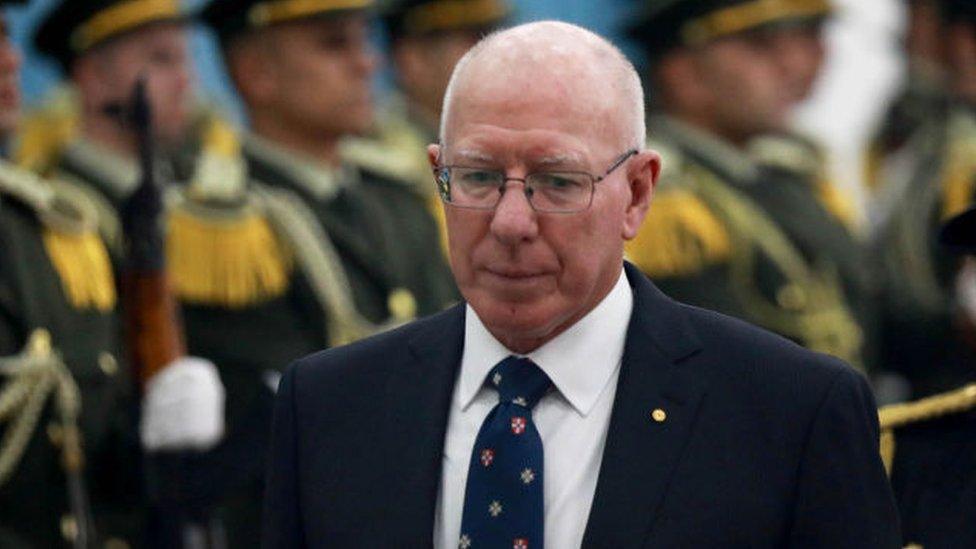
- Published9 September 2022
